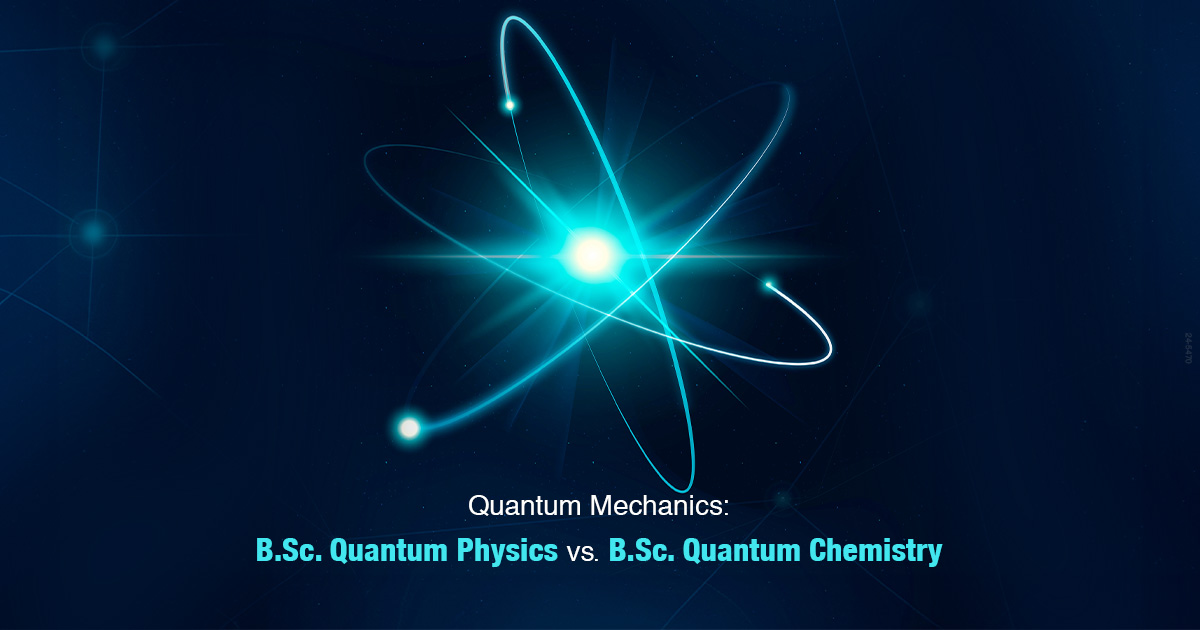Blog Detail


Quantum Mechanics: B.Sc. Quantum Physics vs. B.Sc. Quantum Chemistry
05-10-2024

The realms of Quantum Physics and Quantum Chemistry represent two fascinating branches of science that delve into the fundamental nature of matter and energy at the atomic and subatomic levels. Pursuing a Bachelor of Science (B.Sc.) degree in Quantum Physics or Quantum Chemistry offers an opportunity to unravel the mysteries of the quantum world. Both programmes share a foundational understanding of quantum mechanics, ensuring that students acquire a solid theoretical background in the principles governing the behaviour of particles and waves at the quantum level.
A B.Sc. in Quantum Physics immerses students in the fundamental principles governing the behaviour of particles and waves at the quantum level. Graduates often find themselves at the forefront of groundbreaking research, exploring avenues in quantum computing, telecommunications, and experimental physics. On the other hand, a B.Sc. in Quantum Chemistry combines quantum mechanics with a chemical perspective. Students in this programme explore the quantum aspects of molecular structures, chemical reactions, and spectroscopy.
Course duration
The duration of a B.Sc. in Quantum Physics typically spans three years. The first year often involves foundational physics, mathematics, and general science courses, setting the stage for more specialised quantum physics coursework in the subsequent years.
Like Quantum Physics, a B.Sc. in Quantum Chemistry typically spans three years. The initial years often involve foundational general chemistry, mathematics, and physics courses, laying the groundwork for the more specialised quantum chemistry coursework.
Curriculum
The quantum physics curriculum strongly emphasises understanding the theoretical foundations of quantum mechanics exploring the behaviour of particles, waves, and fields. The mathematical component is crucial, providing students with the tools to solve complex problems and model physical phenomena. Including laboratory work enhances practical skills, allowing students to apply theoretical knowledge to real-world experiments. Core subjects that are taught include:
- Classical mechanics
- Electromagnetism
- Thermodynamics
- Mathematical methods
- Quantum mechanics
- Quantum field theory
- Quantum information and computing
- Astrophysics
- Condensed matter physics
Quantum chemistry, on the other hand, integrates quantum mechanics into studying chemical systems. The curriculum focuses on molecular structures, chemical reactions, and spectroscopic methods. The mathematical aspect is tailored to the needs of chemists, incorporating computational techniques for modelling molecular behaviour. Laboratory work is vital, providing hands-on experience in analysing chemical phenomena. Core subjects include:
- Foundational chemistry
- Mathematical methods
- Quantum mechanics for chemists
- Spectroscopy
- Computational chemistry
- Quantum thermodynamics
- Biochemistry
- Materials Chemistry
- Environmental Chemistry
Career opportunities
Graduates with a B.Sc. in Quantum Physics are well-equipped for various career paths. They may pursue roles in research, academia, or industries involving advanced technologies like quantum computing, telecommunications, and materials science. Diverse and exciting career opportunities awaiting graduates of B.Sc. Quantum Physics programme includes:
- Research scientists contribute to understanding fundamental quantum phenomena involving exploring new quantum materials, developing quantum algorithms for computing, or investigating the behaviour of particles at the quantum level
- Quantum computing specialists work on developing and optimising quantum algorithms, quantum hardware, and quantum information processing
- Telecommunications and electronics experts work on the development of quantum communication technologies, quantum sensors, and quantum-enhanced electronics
- Entrepreneurs work in tech startups or establish their own companies, contributing to developing quantum sensors, quantum communication devices, or other quantum-based technologies
Graduates with a B.Sc. in Quantum Chemistry are well-suited for careers in research and development, pharmaceuticals, materials science, and environmental science. They may also pursue advanced degrees in theoretical or experimental chemistry. Potential career opportunities include:
- Pharmaceutical researchers work on computational drug design, optimising molecular structures for enhanced pharmacological effects, and predicting the behaviour of chemical compounds
- Materials science and nanotechnology experts explore the properties and behaviour of materials at the quantum level. They may contribute to developing new materials with tailored properties and advancing energy storage, catalysis, and nanoelectronics technologies.
- Environmental scientists focus on understanding chemical processes affecting the environment. Graduates may work on computational models to predict the impact of pollutants, study atmospheric reactions, or design eco-friendly materials.
- Quality control and analytical chemistry experts ensure chemical compounds' purity, develop analytical techniques, and troubleshoot chemical processes
- Academic researchers contribute to expanding the knowledge base in the field while inspiring the next generation of scientists
While both quantum physics and quantum chemistry share foundational principles in quantum mechanics, their specific focuses and applications set them apart. Whether you're fascinated by the fundamental nature of particles or intrigued by the intricacies of molecular interactions, both paths offer exciting opportunities for exploration and discovery. As quantum technologies continue to advance, graduates from both programmes are poised to contribute significantly to scientific discoveries and technological innovations in their respective fields.